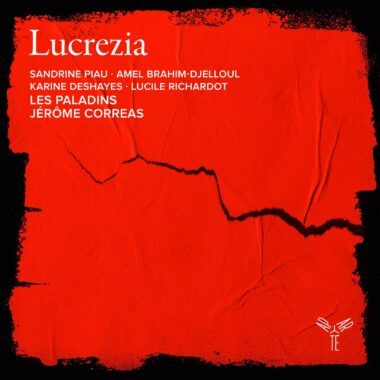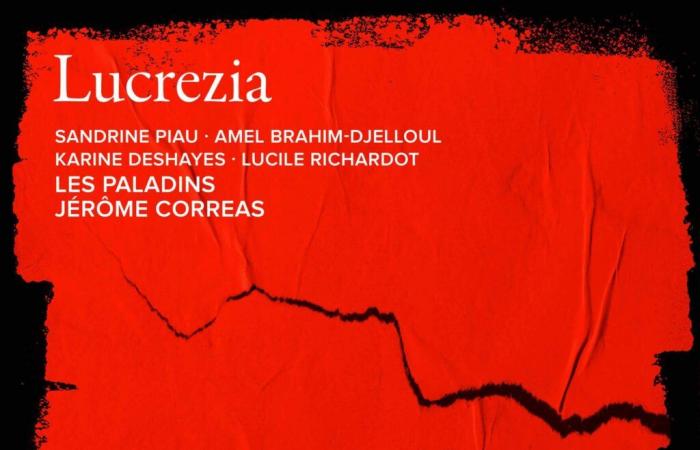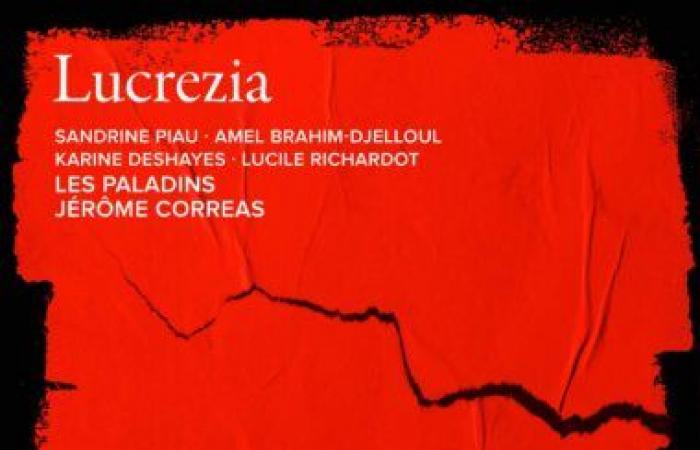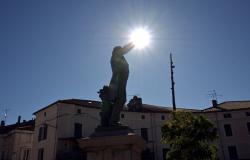More details
Lucrezia, Portraits of a woman. Michel Pignolet de Montéclair (1667-1737) : Death of Lucretia. Bernardo Pasquini (1637-1710) : Symphony. Alessandro Scarlatti (1660-1725) : Lucretia Romana. Benedetto Giacomo Marcello (1686-1739) : Concerto a cinque en fa mineur, Lucrezia. Georg Friedrich Haendel (1685-1759) : Lucrezia H145. Sandrine Piau, Amel Brahim-Djelloul, Karine Deshayes, sopranos. Lucile Richardot, mezzo-soprano. The Paladins, direction: Jérôme Corréas. 1 CD Separate. Recorded in Corbeil-Essonne in September 2023. Notice of presentation in English and French. Duration : 64:00
Aside
Four singers for four Italian cantatas for solo voice which describe the dramatic destiny of Lucretia: this is the original choice of Jérôme Corréas at the head of his ensemble Les Paladins.

 As in Italian paintings of the Baroque period, the scene is located at the most dramatic moment in history: Lucretia has just been raped by Sextus, the son of King Tarquin, and lets her despair burst, calling for help. revenge to cleanse his honor lost in the blood of his suicide. The scene offers us a concentrate of drama carried by a voice at the paroxysm of contrary passions. Four composers took up this theme: Michel Pignolet de Montclair, Alessandro Scarlatti, Georg Friedrich Handel and Benedetto Marcello. The musical languages are different, the aesthetics diverse between the end of the 17the century in Rome (Scarlatti) and tastes united in France at the beginning of the 18th centurye century (Montclair), but we find the same declamatory gesture requiring total commitment on the part of the performer. And it is to best characterize each of the musical universes that Jérôme Corréas has chosen to entrust each cantata to a different singer, with her singularities and her own energy.
As in Italian paintings of the Baroque period, the scene is located at the most dramatic moment in history: Lucretia has just been raped by Sextus, the son of King Tarquin, and lets her despair burst, calling for help. revenge to cleanse his honor lost in the blood of his suicide. The scene offers us a concentrate of drama carried by a voice at the paroxysm of contrary passions. Four composers took up this theme: Michel Pignolet de Montclair, Alessandro Scarlatti, Georg Friedrich Handel and Benedetto Marcello. The musical languages are different, the aesthetics diverse between the end of the 17the century in Rome (Scarlatti) and tastes united in France at the beginning of the 18th centurye century (Montclair), but we find the same declamatory gesture requiring total commitment on the part of the performer. And it is to best characterize each of the musical universes that Jérôme Corréas has chosen to entrust each cantata to a different singer, with her singularities and her own energy.
The Death of Lucreziawritten in Italian by Michel Pignolet de Montclair in 1728, perfectly illustrates the ultramontane taste in France of the time. Sandrine Piau’s supple voice, full of nuances, balances happily between ecstasy and violence. There Romanian Lucretia by Alessandro Scarlatti is entrusted to Amel Brahim-Djelloul and constitutes the great discovery of this recording. His total dramatic commitment to contrasts and the force of words makes the emotion palpable. The spoken-sung recitatives are particularly expressive. But it is at the moment of Lucretia’s death that it reaches its peak: after an incredible long duration in the last leitmotif But what will you do, my heartson Goodbye unaccompanied finale, in an admirable pianissimo, leaves us as bloodless as the heroine. Karine Deshayes offers her beautiful virtuosity to the famous Lucrezia by Handel (repertoire in which we appreciated Sandrine Piau in 2022 with the same Paladins). If his assertive bel-canto takes precedence over the intelligibility of the text, his very controlled vocalizations in the high notes impress (until the last word, which makes the idea of revenge disappear). It is Lucile Richardot who embodies Benedetto Marcello’s Lucrezia, a demanding role which highlights the incredible ambitus of the mezzo-soprano. The contrasts are exacerbated between despair and exaltation, close to madness where Lucile Richardot’s taste for extravagance excels. Here again, theGoodbye finale is a long pianissimo which surprises by the absence of harmonic conclusion, as if left in suspense by death.
The instrumental ensemble is in unison with the expressiveness of the voices. The continuo is masterfully performed on the harpsichord and organ by Jérôme Corréas himself. The harmonic boldness of Marcello is found in a Concertain to five serving as an instrumental interlude, the missing parts of which had to be rewritten. Likewise in Handel’s cantata, Jérôme Corréas added some violin accompaniment in the recitatives. In the text of the libretto, the conductor specifies that beyond the exploration of human feelings, these cantatas offer a dialogue between the intimate and the political, because the suicide of Lucretia participates in the fall of King Tarquin and the establishment of the Republic in Rome. The heroine’s sacrifice takes on a universal dimension, and shows us a strong woman breaking the law of silence rather than a victim.
(Visited 1 times, 1 visits today)
More details
Lucrezia, Portraits of a woman. Michel Pignolet de Montéclair (1667-1737) : Death of Lucretia. Bernardo Pasquini (1637-1710) : Symphony. Alessandro Scarlatti (1660-1725) : Lucretia Romana. Benedetto Giacomo Marcello (1686-1739) : Concerto a cinque en fa mineur, Lucrezia. Georg Friedrich Haendel (1685-1759) : Lucrezia H145. Sandrine Piau, Amel Brahim-Djelloul, Karine Deshayes, sopranos. Lucile Richardot, mezzo-soprano. The Paladins, direction: Jérôme Corréas. 1 CD Separate. Recorded in Corbeil-Essonne in September 2023. Notice of presentation in English and French. Duration : 64:00
Aside
Keywords of this article







